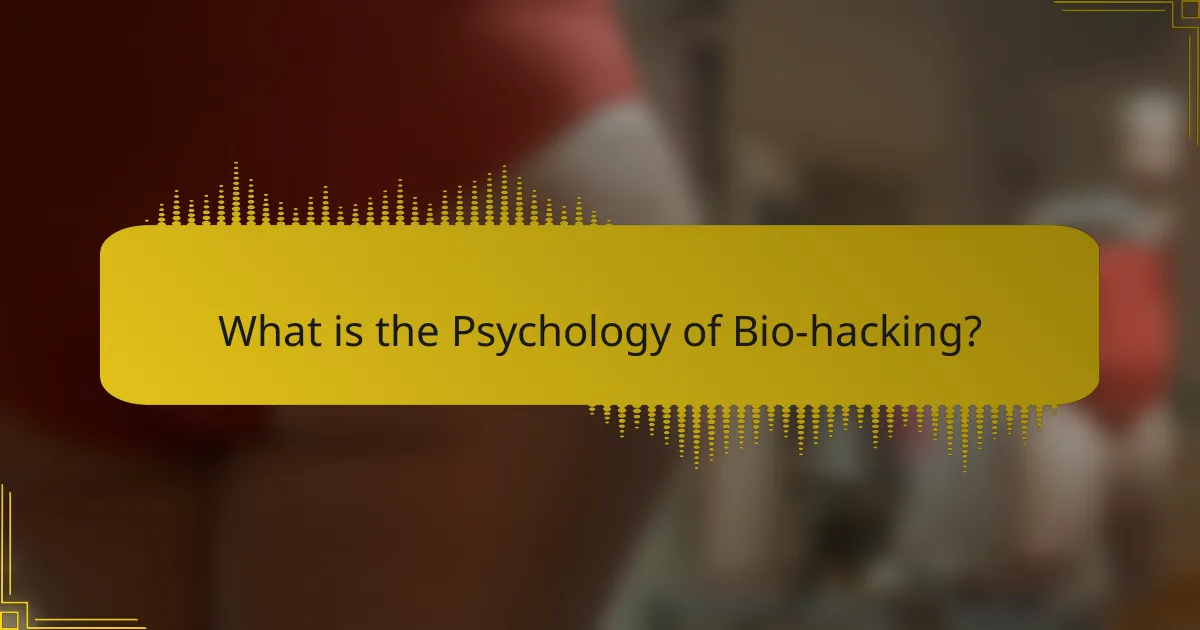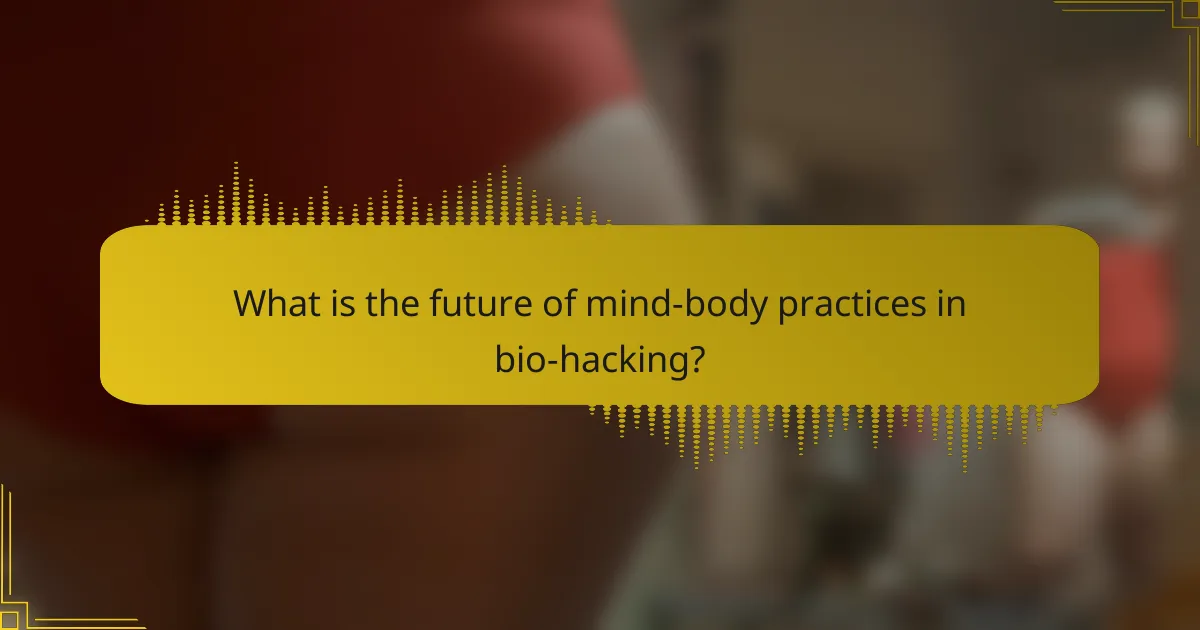Unlocking the mind-body connection through the psychology of bio-hacking can significantly enhance performance and well-being. This approach utilises techniques like mindfulness, neurofeedback, and cognitive training to improve focus and emotional regulation. Bio-hacking also emphasises personalised strategies tailored to individual goals and biological markers. Ultimately, understanding these psychological and physiological factors empowers individuals to achieve optimal health outcomes.

What is the Psychology of Bio-hacking?
The psychology of bio-hacking focuses on optimising mental and physical performance through self-experimentation and behavioural changes. This approach enhances well-being by leveraging the mind-body connection. Techniques such as mindfulness, neurofeedback, and cognitive training are employed to improve focus and emotional regulation. Research indicates that individuals who engage in bio-hacking report increased productivity and better stress management. By understanding and manipulating psychological and physiological factors, bio-hacking empowers individuals to achieve their personal and professional goals.
How does bio-hacking relate to mind-body practices?
Bio-hacking enhances mind-body practices by optimising mental and physical performance through self-experimentation and awareness. Techniques like meditation and nutrition adjustments can significantly improve cognitive function and emotional well-being. Research shows that integrating bio-hacking with mind-body practices leads to measurable benefits, such as increased focus and reduced stress levels. This synergy fosters a holistic approach to health, emphasising the importance of mental and physical alignment for overall enhancement.
What are the psychological principles behind bio-hacking?
The psychological principles behind bio-hacking focus on optimising mental and physical performance through self-experimentation and awareness. Techniques like mindfulness and cognitive behavioural strategies enhance self-regulation and resilience. Understanding neuroplasticity allows individuals to rewire their thought patterns, improving motivation and well-being. Additionally, the use of biofeedback provides real-time data, enabling users to adjust behaviours based on physiological responses. These principles empower individuals to take control of their health and performance effectively.

What are the universal benefits of mind-body practices?
Mind-body practices offer universal benefits that enhance performance and well-being. These practices foster improved mental clarity, reduce stress, and promote emotional resilience. Regular engagement leads to increased focus and productivity, while also supporting physical health through better sleep and reduced anxiety levels. Notably, these benefits create a unique synergy, amplifying overall life satisfaction.
How can mind-body practices enhance mental clarity?
Mind-body practices enhance mental clarity by integrating physical and mental disciplines, leading to improved focus and cognitive function. Techniques like mindfulness meditation and yoga promote relaxation, reduce stress, and increase awareness, which are essential for mental clarity. Research shows that regular engagement in these practices can lead to structural changes in the brain, enhancing areas responsible for attention and decision-making. As a result, individuals experience heightened mental acuity and better emotional regulation, contributing to overall well-being and performance.
What impact do these practices have on physical health?
Bio-hacking practices significantly enhance physical health by optimising body functions and improving overall well-being. These practices, such as dietary adjustments and mindfulness techniques, lead to increased energy levels and better stress management. Regular bio-hacking can result in measurable benefits, including improved cardiovascular health and enhanced immune response. Studies show that individuals engaging in bio-hacking report higher physical performance and resilience against illness.
How do mind-body practices improve emotional well-being?
Mind-body practices significantly enhance emotional well-being by promoting stress reduction, increasing self-awareness, and fostering emotional resilience. Techniques such as meditation, yoga, and deep breathing exercises activate the body’s relaxation response, leading to lower cortisol levels and improved mood. Research indicates that regular engagement in these practices can lead to a 30% reduction in anxiety and depression symptoms. Additionally, these practices cultivate mindfulness, allowing individuals to better manage their emotions and respond to stressors more effectively.

What unique techniques are used in bio-hacking for mind-body connection?
Bio-hacking techniques for enhancing the mind-body connection include neurofeedback, meditation, and breathwork. Neurofeedback trains brain activity to improve cognitive function. Meditation fosters mindfulness, reducing stress and enhancing emotional regulation. Breathwork techniques optimise oxygen intake, influencing mental clarity and emotional stability. These methods uniquely contribute to overall well-being and performance enhancement.
What role does meditation play in bio-hacking?
Meditation enhances bio-hacking by optimising mental clarity, focus, and emotional regulation. It facilitates a stronger mind-body connection, leading to improved performance and well-being. Regular meditation practice can reduce stress and increase resilience, which are essential attributes for effective bio-hacking. Studies show that even short daily sessions can significantly enhance cognitive function and emotional health, making meditation a unique tool in the bio-hacking toolkit.
How can breathwork optimise performance?
Breathwork can significantly enhance performance by optimising mental clarity and reducing stress. It activates the parasympathetic nervous system, promoting relaxation and focus. Studies show that breath control improves cognitive function and physical endurance. Regular practice can lead to increased resilience against stress, enhancing overall well-being and performance in various activities.
What are the effects of neurofeedback on mental performance?
Neurofeedback enhances mental performance by training brain activity for improved focus and cognitive function. Research indicates that individuals experience increased attention span, better emotional regulation, and enhanced memory retention. For example, studies show neurofeedback can lead to significant improvements in executive functions, such as decision-making and problem-solving skills. As a result, users often report heightened awareness and clarity, contributing to overall well-being.

What rare attributes of bio-hacking can enhance performance?
Rare attributes of bio-hacking that enhance performance include neurofeedback, which optimises brain function, and nootropics, which improve cognitive abilities. These elements can lead to enhanced focus, memory, and overall mental clarity. Additionally, personalised nutrition plans based on genetic testing can significantly boost energy levels and physical performance.
How does genetic testing influence bio-hacking strategies?
Genetic testing significantly influences bio-hacking strategies by personalising approaches to enhance performance and well-being. By understanding genetic predispositions, individuals can tailor their diets, exercise regimens, and mental health practices. This customisation leads to optimised results, as strategies align with unique biological needs. For instance, genetic markers can indicate optimal nutrient intake, exercise types, and recovery protocols. Consequently, individuals can achieve better outcomes in their bio-hacking efforts, ultimately unlocking the mind-body connection for improved overall health.
What is the role of nootropics in cognitive enhancement?
Nootropics play a significant role in cognitive enhancement by improving focus, memory, and overall mental clarity. These substances, often referred to as “smart drugs,” can increase neurotransmitter levels, enhance brain function, and support neuroprotection. Research indicates that certain nootropics, such as racetams and adaptogens, may offer unique benefits, including reduced mental fatigue and improved learning capacity. As a result, bio-hackers leverage nootropics to optimise their cognitive performance and achieve greater mental resilience.

How can bio-hacking be tailored for individual needs?
Bio-hacking can be tailored for individual needs by assessing personal goals, biological markers, and psychological factors. Customised approaches enhance performance and well-being.
Individuals can utilise various bio-hacking techniques such as diet modifications, exercise regimens, and mindfulness practices, all adjusted to their unique attributes. For example, tracking sleep patterns and cognitive responses helps in creating a personalised plan.
Additionally, the integration of technology, like wearable devices, provides real-time data to refine strategies. This data-driven approach supports continuous improvement and adaptation to evolving personal needs.
Ultimately, understanding the psychology behind bio-hacking enables individuals to unlock their mind-body connection, leading to significant enhancements in overall health and performance.
What are the best practices for personalising bio-hacking approaches?
To personalise bio-hacking approaches effectively, individuals should assess their unique psychological and physiological profiles. Tailoring strategies to specific mental and physical attributes enhances overall performance and well-being.
Identifying core motivations is crucial; understanding whether the goal is stress reduction, cognitive enhancement, or physical health can guide personalised interventions. Incorporating mindfulness practices, such as meditation or breathing exercises, can improve self-awareness and foster a stronger mind-body connection.
Tracking progress through journals or apps allows for adjustments based on individual responses to various bio-hacking techniques. Experimenting with different methods, such as dietary changes, exercise routines, or sleep optimisation, helps identify what works best for each person.
Finally, seeking support from communities or professionals can provide valuable insights and accountability, reinforcing commitment to personalised bio-hacking journeys.
How to assess individual performance metrics?
To assess individual performance metrics, focus on quantifiable data linked to psychological and physiological factors. Measure cognitive abilities, emotional resilience, and physical health indicators. Utilise tools like self-assessments, biometric data, and performance feedback. Regular evaluations enhance understanding of the mind-body connection and its impact on overall performance.
What are common pitfalls to avoid in bio-hacking?
Common pitfalls in bio-hacking include neglecting mental health, overemphasising quick fixes, and ignoring individual differences. Focusing solely on physical changes can lead to burnout and anxiety. Additionally, failing to track progress or relying on unverified methods can hinder long-term success. Prioritising a balanced approach is essential for sustainable enhancement.

What is the future of mind-body practices in bio-hacking?
The future of mind-body practices in bio-hacking focuses on integrating psychological techniques with physical health strategies. Advances in neuroscience highlight the potential for enhancing performance and well-being through practices like meditation and breathwork. Research indicates that these methods can improve cognitive function and emotional regulation, creating a unique synergy between mind and body. As bio-hacking evolves, personalised approaches will likely emerge, utilising data analytics to tailor mind-body interventions for individual needs. This shift emphasises the role of mental resilience in achieving optimal health outcomes.
What advancements can we expect in 2025?
In 2025, advancements in the psychology of bio-hacking will enhance mind-body connections, improving performance and well-being. Innovations will likely focus on neurofeedback technologies, personalised mental training programmes, and integrative wellness strategies. These developments will aim to optimise cognitive function and emotional resilience, making mental health support more accessible and effective. Research will also explore the interplay between nutrition, exercise, and psychological states, leading to holistic approaches for peak performance.
How can emerging technologies influence bio-hacking?
Emerging technologies can significantly enhance bio-hacking by optimising the mind-body connection. Innovations such as wearable devices, neurofeedback tools, and AI-driven analytics facilitate real-time monitoring of physiological and psychological states. These technologies enable individuals to tailor their bio-hacking strategies, improving performance and well-being. For example, wearable sensors can track sleep patterns and stress levels, providing actionable insights for personal development. As a result, users can make informed adjustments to their routines, maximising the benefits of bio-hacking practices.

What actionable tips can enhance your bio-hacking journey?
To enhance your bio-hacking journey, focus on optimising your mental state and physical health through practical strategies. Prioritise mindfulness practices like meditation to strengthen the mind-body connection. Incorporate regular physical activity to improve cognitive function and emotional well-being. Experiment with nutritional adjustments, such as a balanced diet rich in omega-3 fatty acids, which support brain health. Utilise sleep optimisation techniques, including consistent sleep schedules and a dark, quiet environment, to enhance recovery and performance. Finally, track your progress using biofeedback tools to identify what strategies yield the best results for you.
What daily habits can support effective mind-body practices?
Daily habits that support effective mind-body practices include regular meditation, physical exercise, balanced nutrition, and adequate sleep. These habits enhance focus, reduce stress, and improve overall well-being. Consistent mindfulness practices, such as deep breathing or journaling, can further strengthen the mind-body connection. Engaging in social interactions and spending time in nature also contribute positively to mental health, promoting resilience and emotional stability.
How to create a sustainable bio-hacking routine?
To create a sustainable bio-hacking routine, focus on integrating psychological techniques that enhance the mind-body connection. Start by setting clear goals that align with your performance and well-being aspirations. Incorporate mindfulness practices, such as meditation, to improve mental clarity and reduce stress. Use data tracking tools to monitor your progress and adjust your routine based on insights gained. Prioritise sleep hygiene, nutrition, and physical activity as foundational elements that support your bio-hacking efforts. Lastly, maintain consistency and flexibility, allowing your routine to evolve as your needs change.